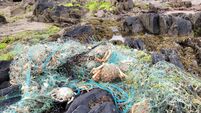'I brought the concept of zero-waste weddings to the table': The impact of sustainable events

Use vintage crockery and buy cloth napkins. You’ll still be using them for parties a decade from now
In 1987, The Brundtland Report, also known as Our Common Future, introduced the concept of sustainability, which has since become a buzzword, and the need for global co-operation to protect the environment.
To fully appreciate the impact of this report, it helps to remember some of the infamously extravagant events that preceded its publication:










